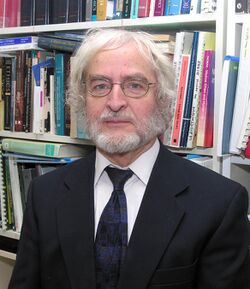Biography:Marcel J. Melançon
Marcel J. Melançon (born 1938) is a Canadian philosopher and scientist. He was born in Saint-Barnabé, Quebec, in 1938, and is mostly known for his book on the French philosopher Albert Camus Albert Camus, An Analysis of his thought (Albert Camus. Analyse de sa pensée).[1] He has mostly worked together with the biologist Richard D. Lambert.
Professor Melançon teaches in the Department of Philosophy in the Université du Québec à Chicoutimi and he is a researcher in bioethics funded by SSHRC (Fonds de la recherche en santé du Québec-FRSQ) and the "Programme de soutien des chercheurs de collège" (PSCC).
He is also Associate Professor in the Department of Religion and Ethics at the same university where he is co-director of a graduate program in bioethics.
He received a master's degree in experimental medicine with a specialty in genetics from Université Laval in Québec, and a doctorate in philosophy from the University of Fribourg in Switzerland.
Professor Melançon has authored more than two books and some articles on ethical issues in genetics, with particular reference to genetic testing and screening. He is currently the Director of an inter-institutional and interdisciplinary group (GÉNÉTHIQ) in Quebec representing researchers in genetics, ethics, sociology and law, and co-director of the ethics division of the Clinical Ethics Network funded by the FRSQ.
Professor Melançon is a founding member of the Canadian Bioethics Society where he served as vice-president from 1986 to 1988. He is also a member of various bioethics committees and, also, a member of the NCEHR Committee on Evaluation.
Writings
- Albert Camus. Analyse de sa pensée
- Le genome humain: une responsabilite scientifique et sociale (1992) Quebec, les Presses de l'Universite Laval
- "Un mouvement quebecois pour la responsabilite scientifique: le MURS-QUEBEC",(1991) Interface 12 (3)
- The ethics of genetic testing for insurance purposes: ethics of genetic solidarity or ethics of genetic exclusion?, (1991) Assurances 59 (2)
References


